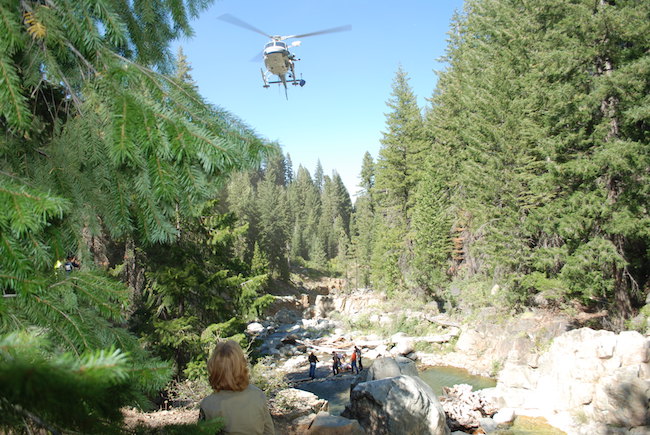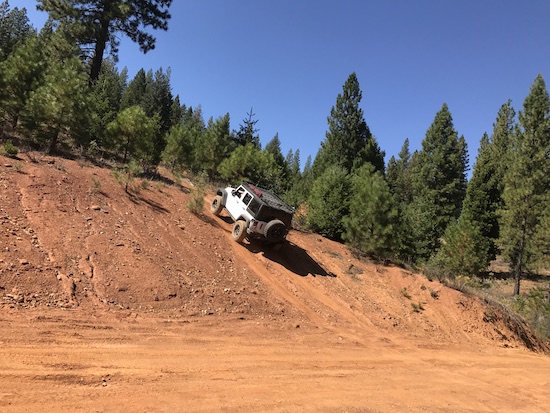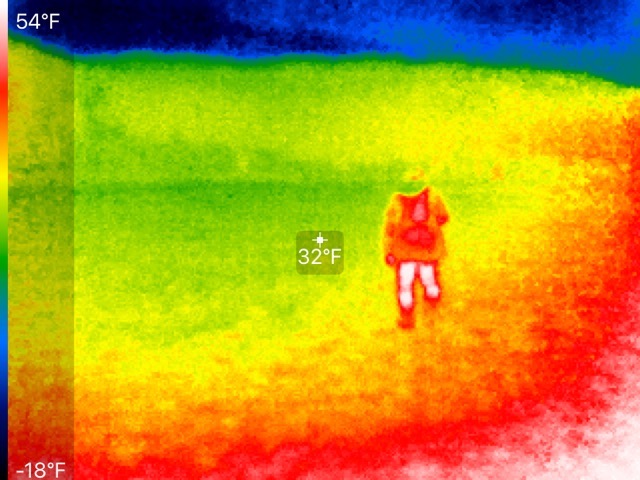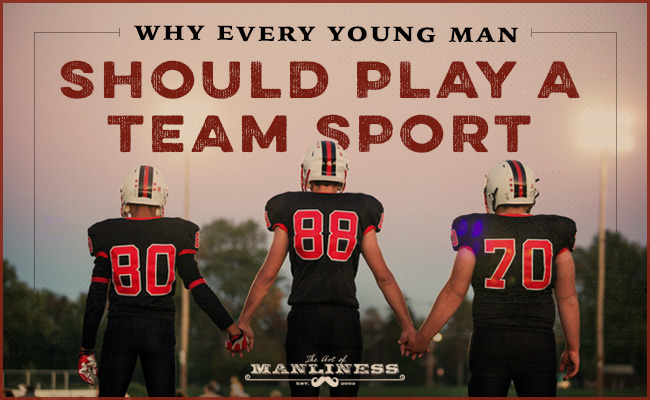
With our archives now 3,500+ articles deep, we’ve decided to republish a classic piece each Friday to help our newer readers discover some of the best, evergreen gems from the past. This article was originally published in January 2019.
Editor’s note: This is a guest article from Graham Shea.
This is the time of year when people are making goals towards their personal development. Yet the paradoxical thing about seeking to improve one’s self, is that it’s best accomplished by looking outside of it.
A couple years ago I stumbled across an ad in the paper which said that my local search and rescue team was recruiting volunteers. SAR teams are called upon to help people who are in potential distress or imminent danger, often going “off road” to look for those who are missing or feared lost because of accident, foul play, mental health, or natural disasters.
While I had concerns about whether I had the skills, time, and disposition to serve my community in this kind of role, I signed up anyway.
After undergoing some classroom training and taking the state oath of office, I was issued a pager, a radio, and a very orange shirt, and immediately started going out on calls. Very quickly, I began to see that by seeking to help others, I was sharpening myself, and that volunteering for search and rescue brings many benefits to one’s life.
The Benefits of Joining a Search and Rescue Team

1. The Chance to Scratch a Deep Itch
Search and rescue teams have been around since the dawn of human existence. The need to find and save comrades is a primal, deeply-set drive. Maybe you’ve felt the hunger to find yourself in a real emergency that calls on everything you’ve got for the sake of a cause bigger than yourself. Maybe you’ve secretly fantasized about rescuing someone in distress, and find your adrenaline pumping at the thought, but it feels like a distant, once-in-a-lifetime opportunity.
Though it may seem like all danger has retreated from the world, and there are no longer opportunities to scratch this itch for aiding those in the thick of it, the need for this service in fact remains very significant. There are opportunities to function in this capacity as part of a SAR operation every week in your community.
2. Motivation to Stay Skilled and in Shape
When it comes to the development of our skills and fitness, we typically rely on self-imposed challenges to stay motivated. But we frequently find that we still yearn not only to possess such capacities for personal pleasure, but to test and utilize them in the real world. When we know that our mental and physical skills might be put to real use, we’re more driven to keep them sharp.
I always wanted to stay in shape, but it was just too easy not to. When I joined a search and rescue team, however, staying in shape became about more than just me. I might (and did) suddenly have to hike 12 miles down a trail in the middle of the night to respond to a hiker’s personal locator beacon, or lift the full weight of a woman on a backboard as we transported her up a canyon cliff from her mangled car.
As a volunteer, these challenges weren’t required of me. They were for me to willingly accept, and if there was a task I knew I wasn’t quite up for, there were plenty of other tasks I was, like manning ropes. But I found myself wanting to be prepared for as many exigencies as possible; I became totally hooked on learning new skills and pushing my personal limits.
As the 19th century physical culturist Georges Hebert said, a man ought “to be strong to be useful.”
3. Firsthand Survival Wisdom, or What Not to Do
They say it’s too bad we only die once, because death might be the ultimate learning experience. As an avid outdoorsman, this idea has long haunted me. What deadly risks do I not even know I’m taking? What skills would mitigate those risks? How do real people like me tend to die?
That all sounds dark, but while SAR has given me a sound education in what to do in the outdoors, it’s also offered a rare and priceless look at what not to do — the enemies (hypothermia, trauma from a fall, poor planning, disorientation, etc.) most likely to kill me and my recreation partners. Despite what you might think, these things are not intuitive. You can read about them in a book, but the way they manifest themselves in the real world is more baffling and unexpected. The average person will never get to see these specters – at least not before they claim his life, or the life of a loved one.
Because I volunteer for SAR, I can now see a two-foot-deep river as a deadly trap, and at the same time have the confidence to do things that would have otherwise felt much riskier, knowing I’ve taken wise precautions based on experience. My SAR teammates also serve as a bottomless well of survival wisdom from accumulating years of field-tested observations.
4. Knowledge (and Mastery) of Yourself in Real Emergencies
I read in Myers Briggs that my personality type was one of the least suited to being an emergency responder. I have thin emotional skin, and am easily affected by intense things. I worried, when that fight or fire or accident came and I got my real chance to be a man, I might crack or panic and regret it the rest of my life.
Yet as SAR calls trickled in, I realized I was actually very good at keeping a level head, and even thrived when things got intense. I also got the chance to practice mindfulness and situational awareness over and over when that adrenaline rush came and seconds mattered. I developed the ability to zoom out, think, and act decisively. This gave me confidence and self-knowledge, which have become some of the most valuable qualities I possess. I don’t know how else I could have attained them.
5. Inside Knowledge of Emergency Systems You Depend On
Have you ever wondered, “What will happen to my family and me if things go south?” You’ve got your sexy bug out bag and prepper supplies, but the rest remains largely a mystery. In my county in California, SAR is under the purview of the sheriff’s department. That means we talk and listen on law enforcement frequencies, and need to know how different agencies operate and integrate at every level from local to national.
It’s easy to theorize about how a given disaster would affect you, but volunteering for SAR puts you on the inside, and even shows you weaknesses in your local systems the public doesn’t know about. It also makes you a part of the solution. You won’t only know evacuation routes and response protocol, you’ll also be well-practiced at executing them. And if you’re ever the one injured calling for help, you’ll know things like how long help will probably take to arrive, what information will expedite your rescue, whom to send it to, and ultimately that it’s your SAR friends and teammates who will be coming for you.
6. Subsidized Training and Certifications
Many SAR teams subsidize or completely pay for training and certifications for team members that will expand the team’s overall capabilities. You may also already have skills you can put to work right away as a SAR team member, like a SCUBA certification, or experience flying drones. Learning new SAR skills not only elevates your capabilities in search and rescue missions, but can also enhance your own recreational pursuits. Consider the following non-exhaustive SAR skills list:
Urban SAR
- EMT
- Confined space SAR
- HazMat training
- Technical rope safety
- Power tools
- Telecommunications
Mountain SAR
- CPR
- Wilderness first responder
- Swiftwater rescue
- 4×4/off-road vehicles
- Low/high-angle rope rescue
- Winter camping
- Snow/ice climbing
- Ski SAR
- Avalanche SAR
- Man tracking
- Canine SAR
- Code 3 driving
A special note on code 3 driving: Not every SAR team is authorized to drive with lights and siren (code 3), but some are. Our county is large and rural, and some emergency calls require us to drive a long distance quickly. SAR team members get certified for code 3 driving the same way law enforcement officers do—with skid pans, cones, and race tracks. It’s great to be able to respond safely to emergencies that much quicker, but let’s be honest — speeding legally is every man’s dream. Flying past a highway patrol and seeing him smile and wave has been one of the highlights of my SAR involvement.
7. Pro Deals
I was always jealous of my friends who worked professionally in the outdoor industry because they got awesome discounts on gear. Hearing that members of my SAR team qualified for these kinds of discounts wasn’t the main reason I joined, but certainly sweetened things. I immediately stocked up on lots of personal outdoor gear that would help me both on and off the team. I even found that companies outside our official collective would offer SAR members discounts on things like infrared cameras or other equipment that would be useful.
8. The Chance to Be Sherlock Holmes (Which You’ve Always Wanted to Do)
Rescues are awesome, but so are searches. SAR isn’t all about brawn. You show up on a search scene, examine the clues, and your mind begins racing through all the possibilities to connect them, knowing the answer could be a stone’s throw away. Searches are intensely strategic. You pay attention to footprints and bits of trash. Your awareness of details grows and sharpens, and you actually get to work, not just wonder.
As a SAR searcher, you may be the only hope for a worried or grieving family. Or you may be the front line of justice if foul play was involved. Yet it’s almost always an un-controversial hero role; SAR volunteers get to be the good guys. Unlike law enforcement, they don’t have to deal with tedious paperwork or belligerent criminals.
I recently got called out to search for a man who had been the primary breadwinner for his family, who were not very well off. It was very unlikely he was alive. He had a decent amount of funds in the bank, but in missing person cases those funds are usually frozen until a body is found. It typically takes seven years for a missing person to be declared dead in absentia of physical evidence. That means a family may lose their savings, not to mention suffer terrible lack of closure, until someone can help find a body or a decisive clue.
Reasons People Don’t Volunteer

As I hope you can see from the case I made above, volunteering with your local search and rescue team offers an often-overlooked opportunity to test and refine your mettle, stock and sharpen your toolbox of manly skills, and serve your local community in a satisfying way.
If you still have reservations about stepping into this kind of role, allow me to address some of the most common concerns about doing so:
“Sounds exciting, but I don’t know if I could handle the emotional strain.”
This was my first and biggest reservation about volunteering. What I didn’t realize was the difference it makes being a helper. The vast majority of calls are not gruesome by any means, but the ones that are haven’t bothered me like I thought they would, because every time I have been glad to be there, and I have slept well knowing that I was there. The worse the call, the harder it is to imagine not being a SAR volunteer.
“I don’t have the prerequisite skills to do this.”
You don’t to be a former or current law enforcement officer or combat medic or all-around MacGyver type to join a search and rescue team. In fact, you don’t need any prerequisite skills at all. Everything you need to know will come in the regular training you’ll do (my team trains one Saturday a month), and from learning on the job.
“I don’t have the extra time to volunteer.”
The time commitment isn’t as big as you may be thinking.
Although SAR teams vary commitment-wise, other than regular training sessions, you may receive just a call or two per week. And responding to these calls isn’t legally required: since SAR personnel are volunteers (as opposed to police or other agencies), there is no contractual obligation to respond if otherwise committed. A call could come at any time, and you go when you can. SAR teams rely on having enough volunteers that not everyone has to cover every call (though the more people that volunteer, the easier they all have it).
Time was definitely my second biggest reservation, but it took a lot less time than I expected. I even soon found myself craving that shrill beeping of my pager, wishing it would happen more often. On many calls, I’d be back home within an hour or two, but with the startling realization I had just rescued someone.
Thinking about it another way, I can’t imagine that hour or two out of my week being put to better use for my own daily purposes.
To my complete surprise, I also started learning to manage my time better. I didn’t stay up late wasting time on pointless distractions, because I felt the need to maintain an energy surplus just in case I had to spend it on a SAR call. Most days that call wouldn’t come, and I’d end up being much more productive in my own pursuits, functioning well within my limits.
I learned, ironically, it’s not the amount of time we have that determines our productivity, it’s the value of our time. And with actual lives on the line, the value of my time skyrocketed.
“Sounds fun, but I’m sure someone else has it covered.”
SAR volunteers unfortunately often go unnoticed because they usually work where news cameras don’t get to go, or have already left.
You might think, then, that official, full-time first responders can cover everything that needs to be done in an emergency. The reality, however, is that each agency has its specialties and limitations, and SAR teams play a vital role in assisting these official responder units.
At the time of writing this, California is just wrapping up its largest SAR operation in history, on its most deadly fire in history, the Camp Fire. SAR teams came together from all over the country to help, with more than 400 active volunteers per day.
It came as a huge shock to me when I began getting called to haul people up cliffs on a backboard and EMT’s and people in badges would step back and literally say, “You’re the expert.” Then they would take out their phones and shoot pictures. In my county, anyone in distress not on pavement finds SAR there to help, not highway patrol or firefighters.
You might also think that even if SAR volunteers are vitally necessary, plenty of other people will step up to serve. In reality, volunteerism nationwide is at a low, and falling every year. Volunteering isn’t something “someone else” will take care of; you are needed!
If you’re interested in volunteering, SAR teams often function in cooperation with local sheriff departments, the National Search and Rescue Association, and the state Office of Emergency Services, so look into these organizations if you want to find out about joining your local team.
The Call to Challenge
Just to be clear, signing on is the only easy part. SAR is challenging work. For me, that was exactly the point. I knew I needed deeper, more meaningful challenges in my life. Self-imposed challenges fell short. I needed to up the stakes on the skills I wanted to learn and practice, but until I discovered SAR I couldn’t find any viable ways to accomplish that without something tantamount to a new career.
Far and above all the other perks, volunteering for SAR ends up being an amazingly satisfying endeavor because you become part of a dedicated, selfless, and professional group of helpers who do good in local communities in the most exciting ways possible. Facing real life-and-death issues for the benefit of my community melted away the existential angst of my easy life immediately, got me outside of myself, and helped me become a better man.
______________________
Graham Shea is a pilot, poet, photographer, and freelance writer. View his blog at grahamshea.blogspot.com, and his photography at grahamshea.com.







